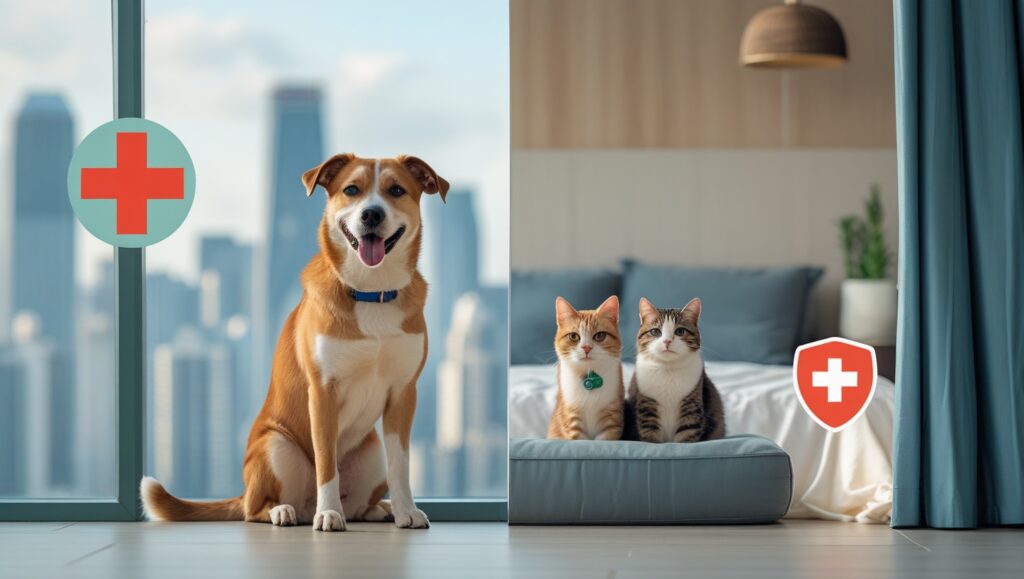
If you rent your home and share it with a four-legged companion, you’ve likely wondered how best to protect both your belongings and your beloved pet. With both pet insurance and renters insurance on the market, it’s easy to get lost in the details. Do you need one, both, or neither? Can pet insurance really save you on vet bills, and does renters insurance help if your dog chews up the carpet? This guide breaks down how much pet insurance is, what renters insurance actually covers, and how to make the best choice for your life in the city.
Lets Understanding Pet Insurance
What Is Pet Insurance?
Pet insurance is a policy that helps cover the cost of veterinary care for your pets—including dogs, cats, and sometimes more exotic companions. With pet insurance, you pay a monthly premium, and in return, the insurer reimburses you for certain covered medical expenses. Plans typically come in these three forms:
- Accident-Only: Covers unexpected injuries like broken bones or ingestion of foreign objects.
- Accident & Illness: Adds coverage for common illnesses, from allergies to cancer.
- Wellness (Routine Care) Add-Ons: Helps with preventive treatments, like annual exams, vaccines, and sometimes spaying or neutering.
If you’re wondering, “does pet insurance cover neutering?” the answer is sometimes yes—but usually only if you purchase an extra wellness plan. Standard accident and illness policies rarely cover elective procedures like spaying or neutering.
How Much Is Pet Insurance? Costs and Factors
How much is pet insurance a month? The cost varies based on several factors:
- Type of Pet: Dogs usually cost more to insure than cats.
- Breed: Some breeds are predisposed to certain health issues, raising premiums.
- Age: Younger pets are cheaper to insure than older ones.
- Location: Urban areas with higher vet costs often mean higher premiums.
- Coverage Level: Plans that cover wellness or have lower deductibles and higher reimbursement rates will cost more.
For example, according to aggregated industry data, the average monthly cost for pet insurance is:
- $30–$60 per month for dogs
- $15–$35 per month for cats
Keep in mind, exotic pets or senior animals may see prices outside these averages. And if you’re searching, “how much is pet insurance for a dog?” you might find that certain breeds (like French Bulldogs) can lead to even higher rates.
What Does Pet Insurance Cover?
Most standard pet insurance policies cover:
- Emergency accidents and injuries
- Common illnesses (ear infections, vomiting, diarrhea)
- Major health issues (cancer, diabetes)
- Hereditary and congenital conditions (if not pre-existing)
- Prescription medications
Not typically covered:
- Pre-existing conditions
- Most dental care (unless caused by accident)
- Cosmetic procedures
- Routine care (unless you purchase a wellness add-on)
Tip: Double-check if treatments like microchipping, vaccines, or dental cleanings require a wellness package.

Now Understanding Renters Insurance
What Is Renters Insurance?
Renters insurance is designed for people who lease their living space. It protects you financially if:
- Your personal belongings are stolen or damaged
- Someone is injured in your apartment and sues you
- You need temporary housing after a covered disaster
Core components of renters insurance are:
- Personal Property Coverage: For items like electronics, furniture, clothes.
- Liability Protection: If your pet or personal actions cause injury to someone.
- Loss of Use: Pays for temporary accommodations if you can’t live in your rented home after a disaster.
Does Renters Insurance Cover Pet Damage or Pet-Related Incidents?
Most renters insurance policies do not cover damage your pet causes to your own property or the landlord’s property. Chewed doors, scratched floors, or shredded carpets are often excluded from personal property claims. However, many policies do include liability coverage if your pet injures someone else or damages their property.
For example, if your dog bites a visitor or knocks over a neighbor’s plant, the liability section of your renters insurance might cover medical bills or repair costs. Still, some insurers exclude certain dog breeds or exotic animals from liability coverage.
Always check the fine print or ask your provider about pet-related exclusions. Policies from major companies like USAA or State Farm will clearly list whether pet damage or injuries are covered.
Pet Insurance vs Renters Insurance: Key Differences
Coverage
- Pet Insurance: Focuses on veterinary bills and your pet’s healthcare needs. Covers accidents, illness, sometimes wellness/routine care.
- Renters Insurance: Focuses on your belongings, liability, and temporary living expenses. Covers loss from theft, fire, or certain natural disasters. May cover injuries caused by pets to others—but not your pet’s vet bills or property damage your pet causes to your own belongings.
Cost
- Pet Insurance Costs: $15–$60/month, depending on pet type and plan features. Wellness add-ons increase premiums.
- Renters Insurance Costs: Generally ranges from $10–$25/month per policy, offering broad protection for your belongings and liability.
Purpose
- Pet Insurance: Helps manage unexpected veterinary expenses and keeps your pet healthy.
- Renters Insurance: Protects your financial wellbeing as a renter; offers peace of mind if your belongings are stolen, damaged, or if you face a liability claim.
Key Distinctions
- Pet insurance never covers your personal property.
- Renters insurance never covers your pet’s medical bills.
Table 1. Quick Comparison
| Feature | Pet Insurance | Renters Insurance |
|---|---|---|
| Vet Bills | ✔️ | ❌ |
| Personal Property Loss | ❌ | ✔️ |
| Liability (Pet-Related) | ❌ | ✔️ (sometimes) |
| Pet Damages to Home | ❌ | ❌/Sometimes (liability only) |
| Routine Care/Neutering | Only with wellness add-on | ❌ |
| Average Monthly Cost | $15–$60 | $10–$25 |
Real-Life Scenarios Where You Need Both
Scenario 1: The Urban Dog Owner
You rent a downtown apartment and just adopted a high-energy rescue dog. He accidentally swallows a sock (hello, emergency vet!), and while you’re away, he chews the carpet and scratches the door. Later, he nips a visitor during a party.
- Pet insurance: Covers the emergency vet bill for the swallowed sock.
- Renters insurance: Might help if the visitor’s injury requires medical treatment and they file a claim, but won’t cover repairs for the carpet or door damage.
Scenario 2: The Cat Mom in the City
Your cat loves perching on shelves and knocks over your neighbor’s antique vase while you’re cat-sitting. A week later, she develops a serious urinary blockage.
- Pet insurance: Covers surgery and medication for the urinary issue.
- Renters insurance: Liability coverage helps pay for your neighbor’s damaged vase if you’re found responsible.
Scenario 3: Routine Hazards
Your city apartment is burglarized; your laptop, camera, and pet food dispenser are stolen. Soon after, your puppy develops a limp.
- Pet insurance: Pays for the puppy’s X-rays and treatment.
- Renters insurance: Reimburses you for stolen property.
Moral: Pet insurance and renters insurance serve very different, but equally important, purposes for urban pet owners.
Make Smart Choices to Protect Your Life and Your Pets
If you’re a pet owner renting in the city, both pet insurance and renters insurance can be crucial to your peace of mind. Pet insurance answers questions like “how much is pet insurance a month?” or “does pet insurance cover neutering?” by offering plans tailored to your needs and your pet’s health. Renters insurance makes sure your stuff and your wallet are safe if things go wrong at home or when you’re out.
Before you decide, compare quotes and policy details. Major insurers and comparison tools make it easy to see exactly what you’ll pay and what’s covered. The best choice is the one that fits your budget, lifestyle, and the furry (or finned, or feathered) friends in your life.
Action Steps & Resources:
- Get a pet insurance quote tailored to your pet’s breed and age.
- Request a renters insurance quote from reputable providers.
- Review your lease for pet-related clauses.
- Contact your insurer to clarify what is (and isn’t) covered.
For more tips or personalized quotes, consult trusted insurance comparison sites or speak with an insurance broker who understands the needs of pet owners and renters alike.









